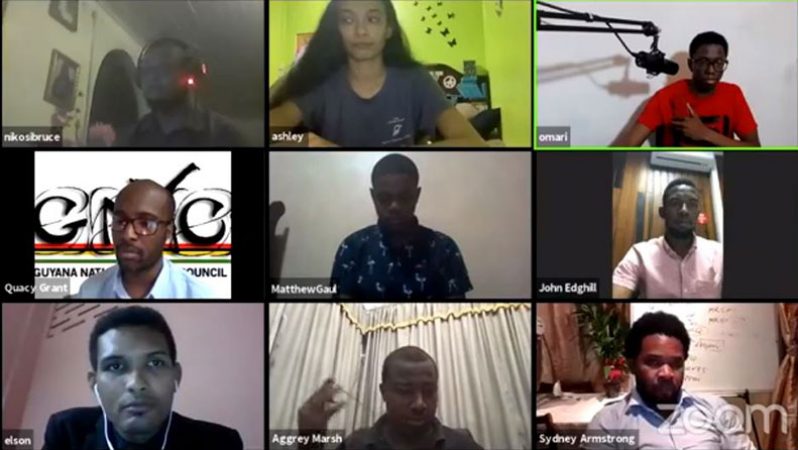– budgetary measures to encourage youth entrepreneurship
– home ownership lauded
THE provision of free education at the University of Guyana (UG) has been a topical matter over the past few years, and, more recently, the People’s Progressive Party/Civic (PPP/C) government pledged to make this a reality, but during a virtual youth forum, few young people had varying views on this.
Friday’s virtual forum was crafted by local youth organisation, ‘Move On Guyana’ and the Guyana National Youth Council (GNYC), with the aim of providing a space for young Guyanese to discuss and debate the 2021 National Budget.
At that forum, however, the ‘Free UG’ matter was raised. Economic and Youth Policy Advisor at the Office of the Leader of the Opposition, Elson Lowe, noted that he was expecting some indication that there would be a gradual move towards ‘Free UG’ in this year’s budget.
Lowe has been heading the ‘Free UG’ movement for the past few years, and has emphasised that Article 27 of the Constitution of Guyana states: “Every citizen has the right to a free education from nursery to university as well as at non-formal places where opportunities are provided for education and training.”
However, final year Economics student at the UG, Matthew Gaul, noted that while there was no mention of ‘Free UG’ in this year’s budget, he is cognisant that the current government promised this within five years.
Indeed, as per the PPP/C’s 2020 to 2025 manifesto, the party promised to “provide free education at the University of Guyana within five years” as part of efforts geared at improving access to education, increasing the quality of education and preparing students for the job market.
‘Free UG’ has garnered much support from many students and Guyanese, then President of the University of Guyana Student Society (UGSS), Jafar Gibbons, had told the Guyana Chronicle in 2019. His predecessor, Devta Ramroop echoed similar sentiments.
Gibbons, who supports making university education free, had noted that while making university education free will be beneficial to many students, careful consideration must be given to ensuring that there are quality teachers and adequate facilities.
Meanwhile, at Friday’s forum, Head of the Department of Economics, Sydney Armstrong highlighted, “When we talk about free university or free education, my discussion is rather than us talking about free university or tertiary education, we should be talking about affordable education.”
A central concern for the economist was whether making tertiary education free would be a sustainable investment for Guyana, cognisant that if UG becomes funded by the ‘oil money’, there would come a time when those funds would not be replenished.
Other concerns for him included who becomes eligible for ‘free UG’ since UG only has the capacity for about 9,000 students, and how to recuperate losses if students do not perform well. He also reminded of the popular adage in economics: There is no such thing as a free lunch. Though UG would be made free, he reminded that cost would be borne elsewhere.
“Emphasis should be placed on making the university of greater quality. Emphasis has to be placed on how the university can strengthen its approach while building the human capital,” Armstrong contended.
At the virtual forum, many of the young people in attendance were eager to hear more about the plans for ‘Free UG’ and how Guyana would pivot into allowing students to study at the national university for free. President of the Guyana National Youth Council (GNYC), Dr. Quacy Grant emphasised that with free tertiary education, efforts must be made to ensure that the youth are also ready to penetrate the job market.
YOUTH ENTREPRENEURSHIP
Importantly, Dr. Grant noted that the GNYC is pleased to see that a portion of the budget is being allocated to help youth entrepreneurs and to help youth generate money for themselves.
“We’re moving into an oil economy and we have to train young people not only to be employees but to become employers,” Dr. Grant noted. He was supported by another youth, John Edghill, who highlighted that the budget offers several ways to access grant financing and financing for young people who are interested in business ownership.
Meanwhile, final year Economics student, Matthew Gaul, also noted that budgetary measures geared at reducing the cost of construction and home ownership were welcomed. In the budget, certain construction materials were zero-rated; there was an increase in the low-income mortgage loan ceiling and the increase in the ceiling for housing loans at the New Building Society.
“It’s very important that as young professionals that we can build our own homes. I think that these measures will be a boon to the construction sector… (and) these measures will benefit us and young professionals,” Gaul said.



.jpg)









